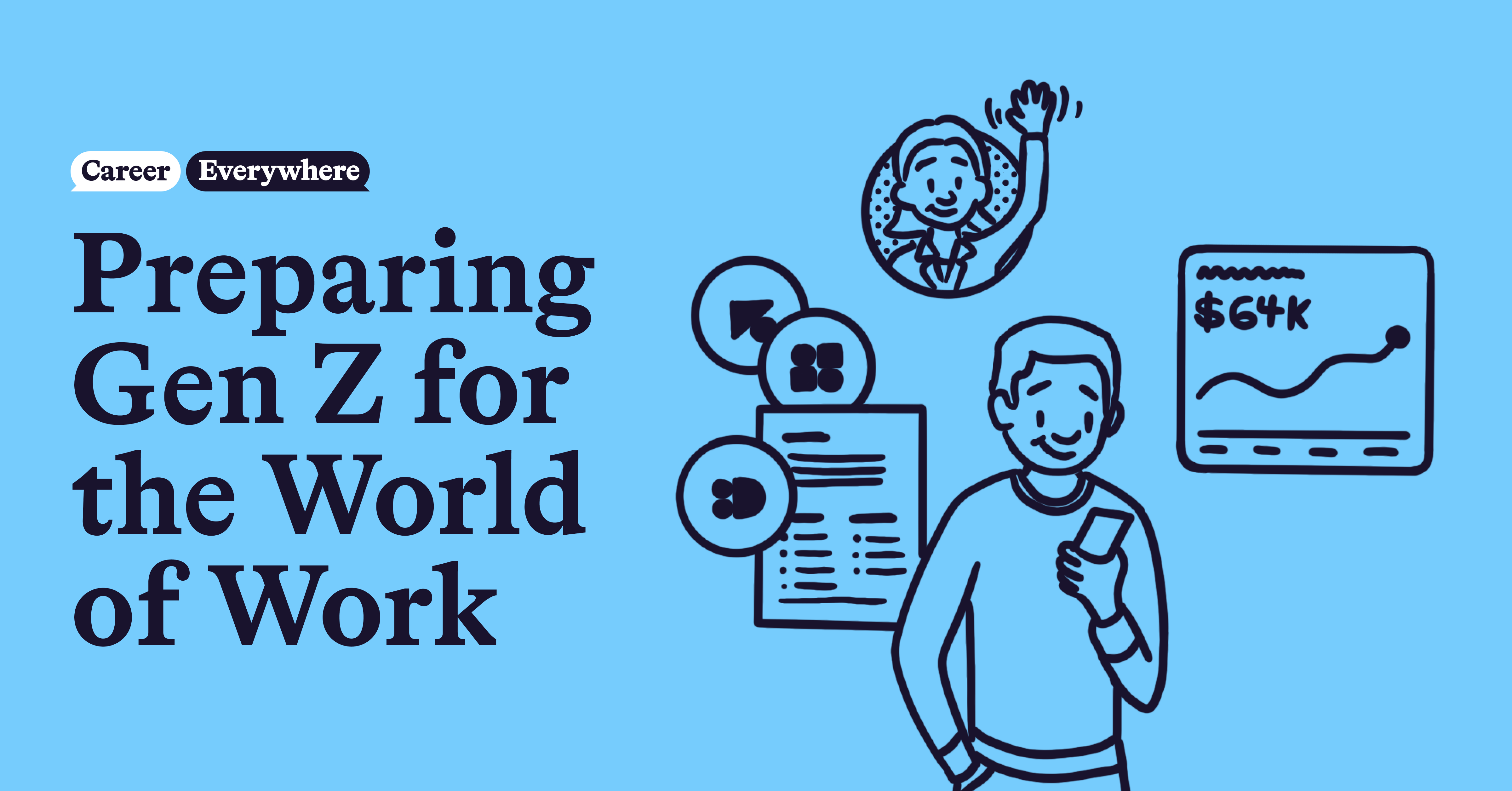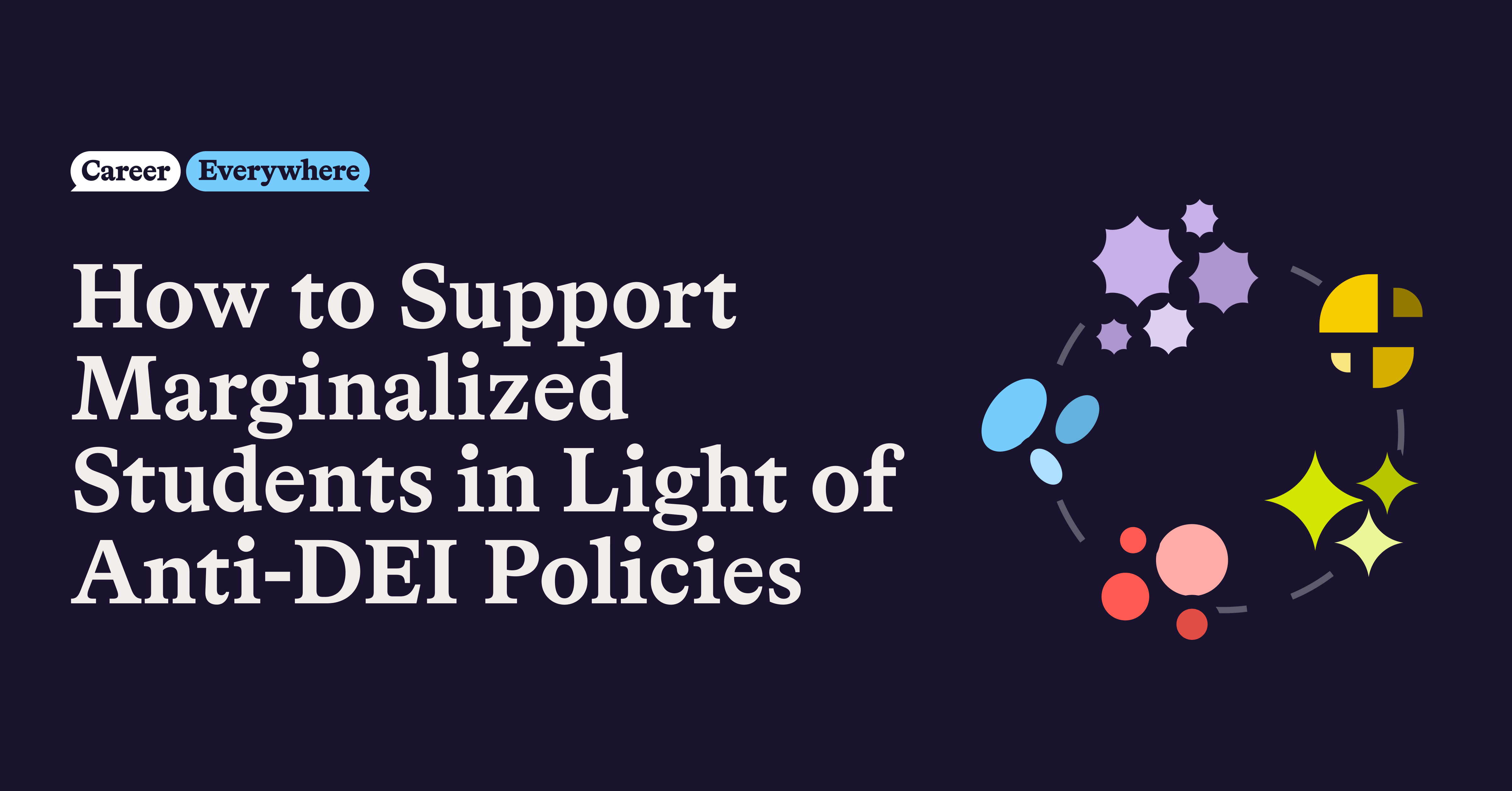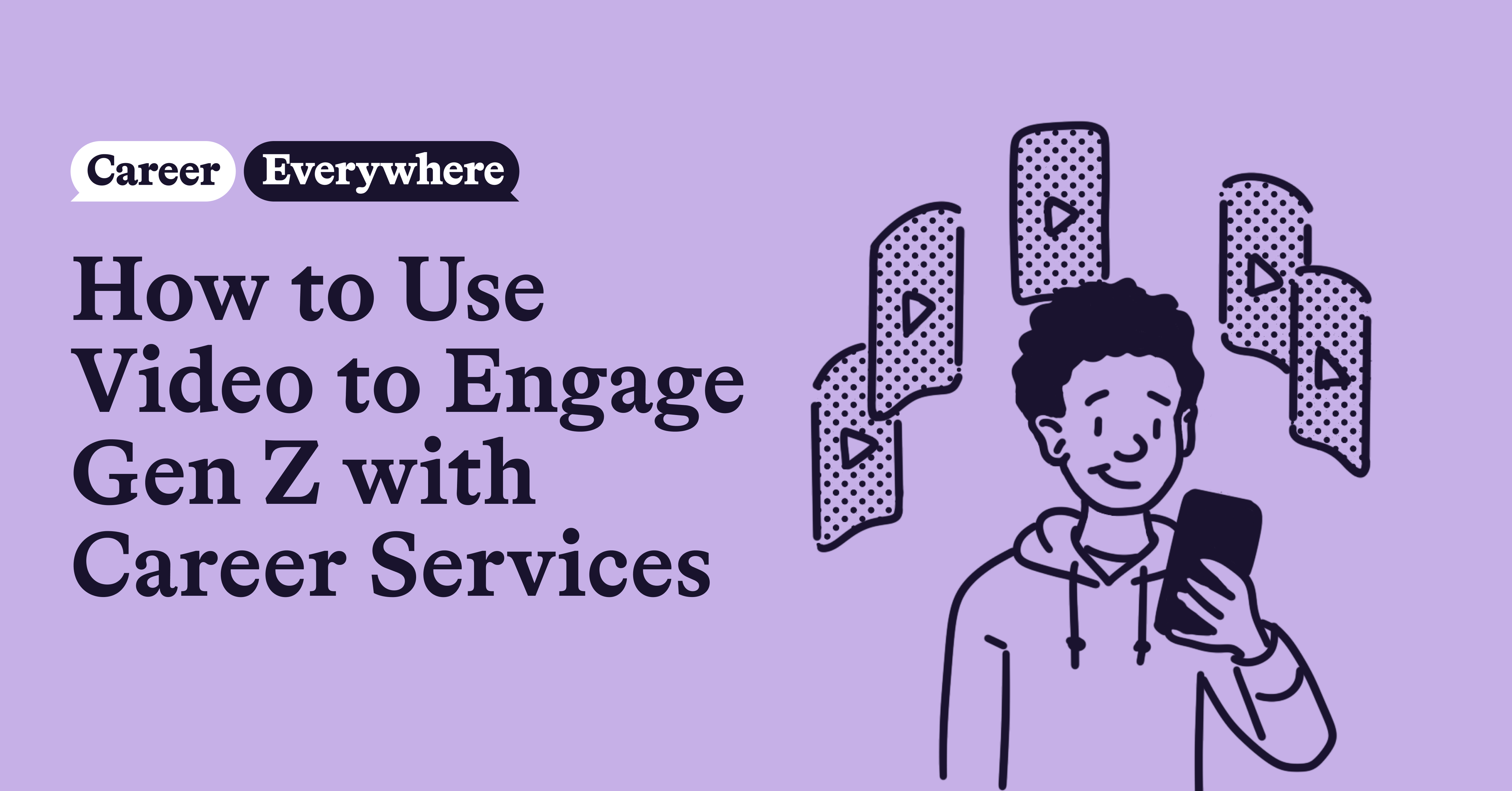
Gen Z may be the misunderstood middle child between the blossoming Generation Alpha and the well-established millennials. However, they are well on their way to making their mark in the world, set to make up 30% of the professional workforce by 2030, according to the Bureau of Labor Statistics.

With this generation rising through the ranks and flooding into post-graduate markets and industries, a new frontier awaits career services professionals on the most effective ways to prepare Gen Z for the world of work.
To gather some best practices, we talked with Ang Richard, the Assistant Director of Career Education at Boston University, a TEDx speaker and LinkedIn Top Voice, and a member of Gen Z herself.
Richard discusses some common characteristics shared by members of Gen Z, including their strengths, values, and how they approach the workplace. She also digs into different ways career services teams can prepare Gen Z for the world of world, including:
- Identifying essential skills for career readiness
- Discussing career exploration and decision-making
- Assisting with professional development and skill-building
- Helping them navigate the job search process
- Providing advice for building a personal brand (something Richard excels at)
- Encouraging an open attitude toward continuous learning
As a bonus, Richard also provides helpful tips on how employers can attract and retain Gen Z talent and shares how career centers can communicate those best practices to their employer partners.
To learn more from Richard about preparing Gen Z for the world of work, check out her episode of the Career Everywhere podcast.
Understanding the characteristics of Gen Z
According to the Pew Research Center, Gen Z encompasses individuals born during and after 1997. This generation is currently entering the workforce, with the oldest members having around five years of professional experience.
Here are a few common characteristics, misconceptions, and professional values, according to Richard:
Common characteristics, values, and strengths
As with every generation, Gen Z has their own set of unique characteristics, values, strengths, and priorities that become apparent in professional settings, particularly in today’s intergenerational workforce.
Broken down, these can include:
1. Digital fluency
Gen Z is the first generation to grow up with the internet, social media, and smartphones from a young age, claiming the term “digital native” for themselves from youth. They are very tech-savvy, using digital tools for communication, learning, and work effectively.
2. Value-centric
This generation places a high importance on values, particularly around environmental sustainability, social responsibility, and ethical practices. They are more likely to engage with brands and employers that align with their personal values and work towards objectives and initiatives that align with their goals.
3. Curiosity and eagerness to learn
Gen Z shows a strong desire for continuous learning and self-improvement. They actively seek new knowledge and skills, often leveraging online resources and educational platforms to expand their learning capacity and become more well-rounded individuals.
4. Transparency and communication
Contrary to some beliefs, Gen Z values open and honest communication. They prefer straightforward interactions and are often very clear about their expectations and feedback from peers, supervisors, and other individuals in the workplace.
5. Consideration and inclusivity
Gen Z is generally more considerate of diversity and inclusion issues. They advocate for a workplace that respects and embraces differences among employees, clients, and other parties.
Common misconceptions about Gen Z
While these are just a few of the many positive characteristics of Gen Z, there are also plenty of misconceptions and judgments aimed at this young generation (particularly in the context of the workplace).
These include:
1. Poor communication skills
It is often assumed that Gen Z struggles with professional communication. However, their communication style is simply different—more direct and transparent—reflecting their digital upbringing that may become more noticeable in an intergenerational workplace.
2. Laziness and ‘quiet quitting’
There’s a stereotype that Gen Z is lazy, partly fueled by the concept of “quiet quitting,” where employees do the bare minimum required without fully resigning from their jobs. In reality, this generation values work-life balance and mental health, challenging traditional notions of overworking and burnout in the professional environment.
What Gen Z values in a professional setting
With these characteristics and misconceptions in mind, it’s important to also have a solid understanding of how these foundational values, expectations, and mindsets translate to the workplace.
1. Social and environmental responsibility
Gen Z expects their employers to take active roles in social and environmental issues. They are drawn to companies with strong corporate social responsibility (CSR) programs, stemming from the large influx of concern towards environmental issues during their youth and adolescence.
2. Work-life balance
Gen Z prioritizes mental health and personal well-being, seeking employers who respect work-life balance and offer flexibility that may not have been commonplace for older generations.
3. Meaningful work
Gen Z desires work that has a purpose and makes a positive impact. They are motivated by roles that contribute to societal good and align with their personal values that reflect on themselves and the company in a tangible sense.
How can career services prepare Gen Z for the world of work?
As career services professionals, it’s always important to use digestible data and maintain a transparent, realistic attitude toward students as they work toward achieving their professional goals. There’s no exception to this with Gen Z. In fact, it’s more important than ever.
“I think it’s really important to be real right now. The job market is tough. It’s a hard, hard fight out there for Gen Z to secure an opportunity related to their major, unrelated to their major, at a company of choice, at more of a safety company,” Richard said. “I mean, we’re seeing unprecedented challenges, competition, lots of odd scenarios out there that Gen Z was not anticipating, right? And gosh, they don’t deserve it, but it is a reality.”
Here are a few ways career services teams can help Gen Z prepare for that reality:
1. Identify essential skills for career readiness
Career services professionals should not only be knowledgeable on the most sought-after skills in specific industries, but they should also coach Gen Z students on general career readiness skills.
According to Richard, these should include:
- Communication skills: Effective verbal and written communication, including professional email etiquette and presentation skills.
- Technical proficiency: Basic and advanced technological skills, including familiarity with industry-specific software and tools.
- Problem-solving abilities: Critical thinking and the ability to address complex challenges creatively.
- Collaboration and teamwork: Working effectively within diverse teams and understanding team dynamics.
- Adaptability and resilience: Ability to navigate and thrive in a rapidly changing work environment.
- Emotional intelligence: Understanding and managing one’s own emotions and empathizing with others.
By participating in extracurricular clubs or organizations, taking on leadership roles in campus entities, familiarizing themselves with industry professionals, or attending networking events, Gen Z can master everything ranging from client brainstorms to technical presentations to on-the-fly troubleshooting.
Richard also recommends the NACE Competencies as a valuable resource for students identifying essential skills. Many institutions also embed uConnect’s Labor Market Insights module on their virtual career center, which allows students (and any other stakeholders) to research the most in-demand skills for different occupations.
2. Discuss career exploration and decision-making
There are many opportunities for students to get a taste of the workforce while still in school, including on-campus jobs, internships, job shadow programs, and more. Your career center probably also has countless resources available to help students explore different career pathways—starting as early as freshman year.
- Self-assessment tools: Use personality and career assessment tools (e.g., Myers-Briggs, StrengthsFinder, Focus 2) to identify interests, strengths, and potential career paths.
- Industry insights: Provide up-to-date information on various industries, job roles, and career prospects no matter their major or field of study. For example, Washington State University includes labor market insights directly on their virtual career center (powered by uConnect).
- Mentorship programs: Connect students with alumni and professionals in their fields of interest for guidance and networking as they begin to search for post-graduate roles.
- Job shadowing and internships: Facilitate opportunities for students to experience different roles and workplaces firsthand before officially taking on the full responsibility of employment.
- Virtual job simulations: Offer free virtual job simulations through a provider like Forage to help students get a feel for the day-in-the-life of different jobs at major companies. See how the University of Nevada Las Vegas does this.
3. Assist with professional development and skill-building
Providing solid, engaging content and events for Gen Z students to participate in allows for advice, mentorship, networking, and other avenues for learning to converge and be demonstrated in multiple high-value formats.
- Workshops and seminars: Offer training on resume writing, interview techniques, networking strategies, and other job search skills.
- Soft skills training: Provide workshops on leadership, time management, conflict resolution, and other essential soft skills that are often overlooked by students looking to gain hard-skill qualifications.
- Certifications and courses: Encourage participation in additional courses and certifications relevant to their career paths that may be outside of a traditional academic catalog or schedule.
4. Help them navigate the job search process
It’s no secret that the job market is daunting right now, especially for recent graduates looking for their first job. But that’s why career centers are so critical for all students! With resources available in the physical career center and online via the virtual career center, career services teams can help students prepare for that college-to-career transition.
Here are a few key ways to help:
- Resume and cover letter assistance: Help students create resumes and cover letters that highlight their skills and experiences, will stand out to recruiters, and will make it through applicant tracking systems.
- Interview preparation: Conduct mock interviews and provide feedback to help students articulate their skills, connect their college experiences to the workplace, and prepare answers and anecdotes that can help them make a strong first impression. This could be through 1:1 meetings, virtual tools like Big Interview, or one-to-many programming like the University of Pennsylvania’s Improv for Interviewing workshop.
- Job search strategies: Teach effective job search techniques, including the use of job boards in campus and community spheres, networking with industry professionals of varied backgrounds, and leveraging social media (particularly LinkedIn).
- Networking opportunities: Organize career fairs, networking events, and mentorship opportunities to allow students to display their social skills and forge meaningful connections with potential mentors, advisors, or even future coworkers and bosses.
5. Advise them on how to build a personal brand
Building a personal brand not only helps Gen Z students attract the attention of potential employers, but it also allows them to control their own professional narrative. Personal branding is something Richard excels at, particularly with her LinkedIn presence. To see how she posts, comments, and has fleshed out her profile, check out her LinkedIn page.
Career services professionals can help students build a personal brand in a few ways, including:
- Online presence: Educate students on the importance of maintaining a professional online presence, including LinkedIn profiles and other social media accounts that may be utilized to determine company fit. Posting content that is representative of their personality and the blend of their personal and professional goals is sure to catch the eye of an employer or mentor. Consistency, repetition, and direction are crucial for this step.
- Personal branding workshops: Host workshops to teach students what a personal brand is, how to build one, where to build it, how to balance professionalism with authenticity and personality, how to use it for networking, etc.
- Portfolio development: Help students build portfolios that showcase their work and accomplishments in a professional, neat, creative, and effective format depending on their ideal industry.
6. Encourage them to embrace continuous learning
In today’s quickly evolving world of work, Gen Z needs to continue to prioritize lifelong learning and ongoing skill development. That way, they retain their ability to adapt to this dynamic job market and keep a competitive edge that will be more likely to yield long-term career success while embracing the thoughts and ideas of others.
- Lifelong learning: Encourage a mindset of continuous improvement and the pursuit of new skills and knowledge.
- Professional development plans: Help students create personalized plans for their ongoing professional growth as they progress through different stages of their career.
- Access to learning resources: Remind students that they will continue to have access to career resources through your career center after graduation, whether that’s LinkedIn Learning courses, Forage virtual job simulations, labor market insights, videos, articles, podcasts, and more.
How employers can attract and retain Gen Z talent (and how career services can partner with employers on this)
Hiring is a two-way street. Of course, candidates want to make a good impression on a potential employer, but employers should also want to make a great first impression on their candidates. This is even more important if employers want to hire and retain Gen Z talent who, ideally, want to work for companies that share their values.
Richard, who bridges the gap between students and employers, says employers should focus on the following to better attract and retain Gen Z employees:
- Be authentic: Clearly articulate your company’s mission, vision, and values. Be transparent about the company culture and what you stand for from the get-go.
- Invest in professional development: Provide ongoing training, mentoring, and development opportunities to help Gen Z employees grow and advance in their careers. Make it clear on your website or in your job descriptions that this is something you value.
- Develop clear career pathways: Take the time to create job levels (with associated pay ranges) and make it clear what is expected of employees to be promoted to the next level up.
- Promote diversity and inclusion: Create a truly welcoming environment where diverse perspectives are valued and inclusion is prioritized. Don’t just talk about it; put in the work.
- Leverage technology: Utilize digital tools and platforms to engage with Gen Z candidates and support their work preferences.
- Offer flexibility: Recognize the importance of work-life balance and provide flexible working arrangements to accommodate different needs and circumstances.
To establish these norms early and create a solid foundation for colleges and businesses to build on, career services offices should seek data-driven partnerships with companies that hire graduates from their institution, and beyond, instilling a sense of collaboration, camaraderie, and positive expectations from the jump.
Here are a few tips to achieve this:
- Communicate regularly: Establish strong relationships between career services and employers to understand their needs and expectations for their employees.
- Create feedback loops: When you receive insights from employers about what they’re looking for in new candidates, share those insights with your students and help them figure out how to use that information to their advantage.
- Organize employer engagement events: Organize events where employers can interact with students, such as career fairs, networking sessions, and panel discussions to foster mutual interest and positive connections.
- Host collaborative workshops: Host joint workshops with employers on relevant topics like industry trends, skill requirements, and career progression for certain industries and the best academic and extracurricular paths leading to success.
Conclusion
There’s no question that Gen Z’s unique characteristics, values, and goals will lead to a highly enriched intergenerational workforce. With the help of career services teams, Gen Z graduates can enter the world of work with the skills, experiences, networks, and resources they need to build meaningful lives and careers.
“I would just like to remind everyone out there, Gen Z listeners, career services leaders, employer partners, whoever you are, stay curious, stay empathetic, approach everyone with kindness, and try to learn from one another. I think we can all benefit from that perspective a little more these days,” Richard said. “It’s exciting to see what’s coming to the workplace. I would encourage everyone to just have an open mind to what that looks like.”
To learn more from Richard about preparing Gen Z for the world of work, check out her episode of the Career Everywhere podcast.


